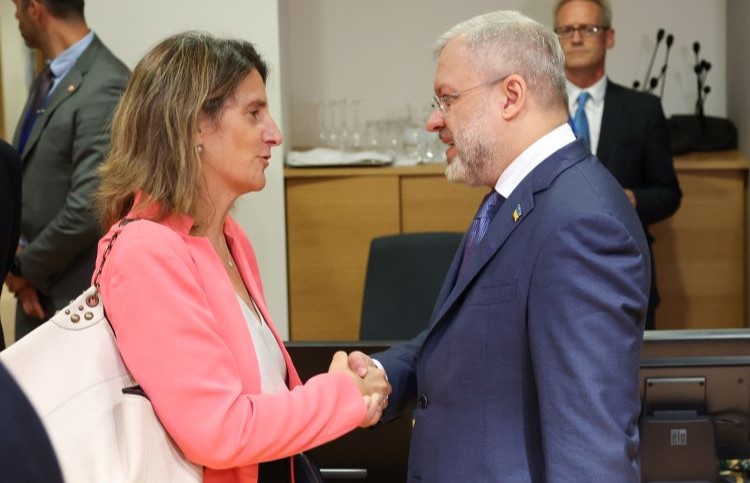The Diplomat
EU Member States approved yesterday in Brussels the European Commission’s proposal to apply a linear 15% cut in the natural gas consumption of all Member States, but included, among the exceptions, countries with “limited interconnections” or with capacities to store and redirect gas “to other Member States”, as is the case of Spain, which will only have to reduce its consumption by 7%.
“Achieved! We have just reached a political agreement that ensures effective solidarity in energy matters,” declared the Ministry for Ecological Transition, through its official Twitter account, at the end of the extraordinary Council of Energy Ministers of the European Union. “Each EU Member State will contribute according to its possibilities and needs,” added the Department, which was represented in Brussels by the third vice-president of the Government and Minister for Ecological Transition, Teresa Ribera.
Ribera herself confirmed at the press conference following the Council that an agreement had been reached to “achieve energy savings of around 7% or 8% of our gas consumption”, an exception that will also favor Portugal. “We want to continue working on a united and solidarity-based response,” but “for that response to be effective, it is essential to be able to incorporate in a flexible way the way in which each country can contribute to supporting its EU neighbors,” she said.
Specifically, Member States reached a political agreement on a voluntary reduction of natural gas demand by 15% this coming winter, the Council said in a statement. The Council Regulation also provides for the possibility of activating a “Union alert” on security of supply, in which case “the reduction of gas demand would become mandatory,” it continued. “The purpose of the gas demand reduction is to make savings before winter to prepare for possible disruptions of gas supplies from Russia, which is continuously using energy supplies as a weapon,” it added.
The Council thus approved, with nuances, the proposal presented last July 20 by the European Commission to reduce consumption by 15% between August 1, 2022 and March 31, 2023, a proposal that was openly rejected by Teresa Ribera. One of the nuances introduced by the Member States is the voluntary nature of the application of the measure, which would only be mandatory in the event that the “Union alert” is activated. The other major nuance has to do with the “exceptions” approved yesterday by the Council in the 15% reduction of gas consumption “in order to reflect the particular situations of the Member States,” the statement continued.
Specifically, those states that have “limited interconnections with other Member States”, that “can demonstrate that their interconnection export capacities or their national liquefied natural gas (LNG) infrastructure can be used to redirect gas to other Member States” through the European solidarity mechanism or that have exceeded their gas storage targets will be exempted from these reductions. Depending on these exceptions -which would include, but not mention Spain-, the mandatory savings for our country (and for Portugal) would be between 7% and 8%, more or less half of Brussels’ initial claim.
Precisely, among the arguments put forward by Teresa Ribera to reject the Commission’s proposal are the storage capacity (Spain’s “is at 80% and that of the rest of Europe at 50% thanks to the investments made in the last 25 years”, which have allowed Spain to have “more than a third of the regasification and storage capacity in Europe”), the infrastructures that allow Spain to be “the gateway for more than 30% of Europe’s liquefied natural gas” and the problems of interconnections (“Spain has been asking for two decades for interconnection obligations to be met”, in spite of which “there has been inaction by the EU” that has turned the country into “almost an energy island”).
For this reason, Ribera went to Brussels yesterday with her own counter-proposals, in which she asked the other Member States to take into account Spanish infrastructures and the gas exports made by Spain to the rest of the European Union in the last five years. Thanks to this export capacity, and to Spain’s six active regasification plants (which represent a third of the regasification capacity of the entire EU and 44% of the European storage potential for liquefied natural gas), Spain could cover at least 13% of the cubic meters of gas that the Commission intends to save with its proposal.
Sanctions on Russia
On the other hand, the Council yesterday extended by six months, until January 31, 2023, the restrictive measures targeting specific sectors of the Russian Federation’s economy. These sanctions, first introduced in 2014 in response to Russia’s actions destabilizing the situation in Ukraine, were significantly extended from February 2022, in light of Russia’s military aggression against Ukraine. They now consist of a broad spectrum of sectoral measures, including restrictions on finance, energy, technology and dual-use goods, industry, transportation and luxury goods. Among those invited to yesterday’s meeting in Brussels was Ukrainian Energy Minister German Galushchenko.







